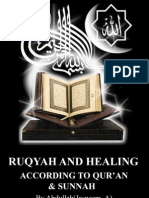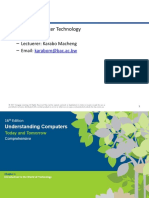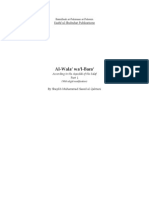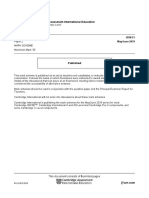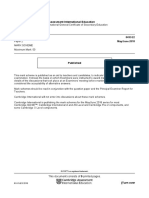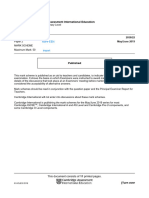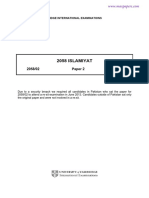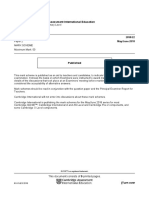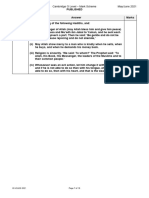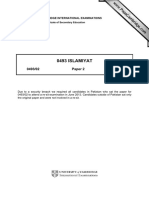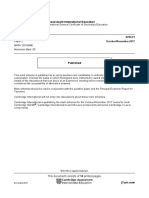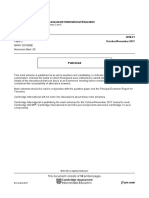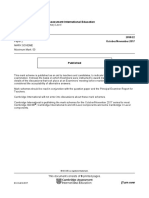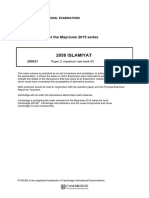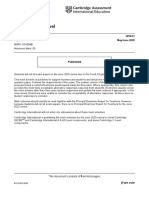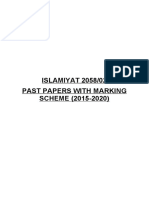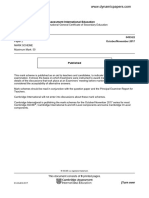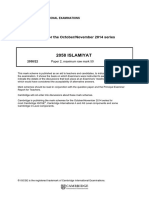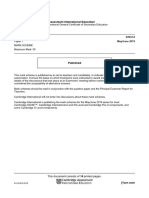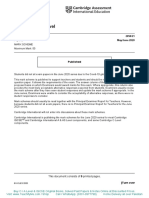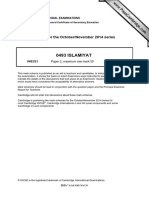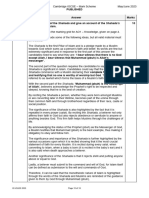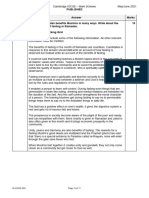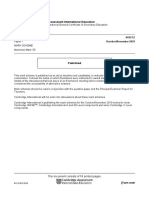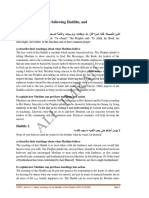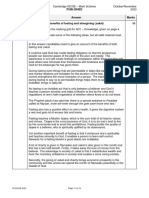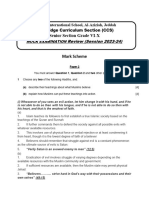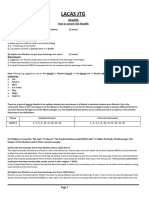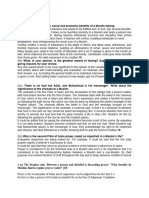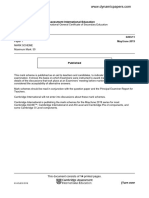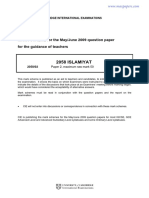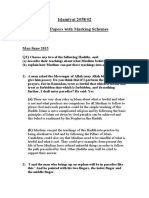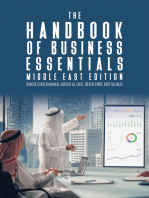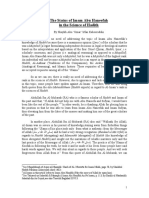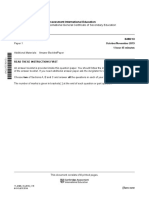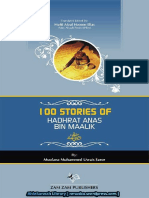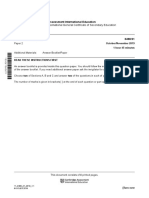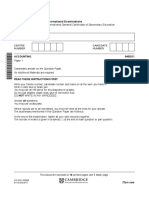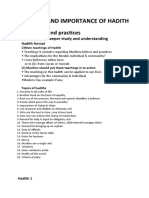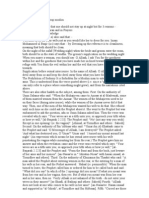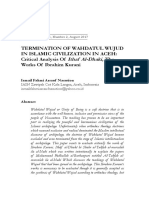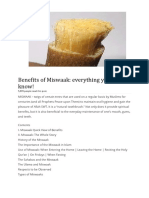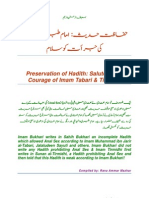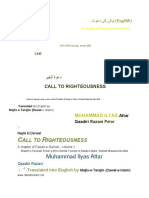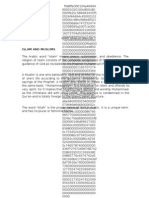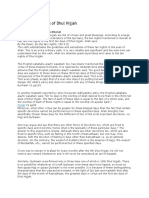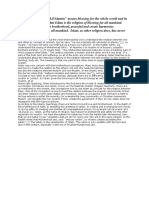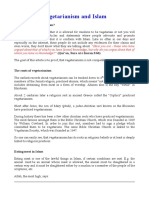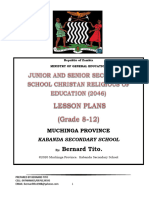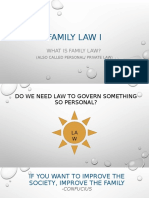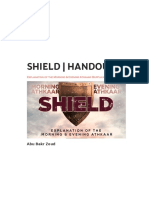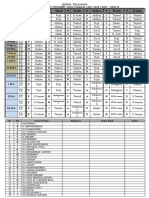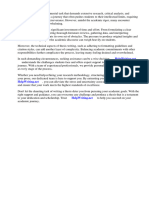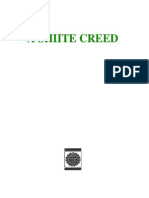Cambridge Assessment International Education: Islamiyat 0493/21 October/November 2019
Cambridge Assessment International Education: Islamiyat 0493/21 October/November 2019
Uploaded by
Mohsan MinhasCopyright:
Available Formats
Cambridge Assessment International Education: Islamiyat 0493/21 October/November 2019
Cambridge Assessment International Education: Islamiyat 0493/21 October/November 2019
Uploaded by
Mohsan MinhasOriginal Title
Copyright
Available Formats
Share this document
Did you find this document useful?
Is this content inappropriate?
Copyright:
Available Formats
Cambridge Assessment International Education: Islamiyat 0493/21 October/November 2019
Cambridge Assessment International Education: Islamiyat 0493/21 October/November 2019
Uploaded by
Mohsan MinhasCopyright:
Available Formats
Cambridge Assessment International Education
Cambridge International General Certificate of Secondary Education
ISLAMIYAT 0493/21
Paper 2 October/November 2019
MARK SCHEME
Maximum Mark: 50
Published
This mark scheme is published as an aid to teachers and candidates, to indicate the requirements of the
examination. It shows the basis on which Examiners were instructed to award marks. It does not indicate the
details of the discussions that took place at an Examiners’ meeting before marking began, which would have
considered the acceptability of alternative answers.
Mark schemes should be read in conjunction with the question paper and the Principal Examiner Report for
Teachers.
Cambridge International will not enter into discussions about these mark schemes.
Cambridge International is publishing the mark schemes for the October/November 2019 series for most
Cambridge IGCSE™, Cambridge International A and AS Level components and some Cambridge O Level
components.
This document consists of 7 printed pages.
© UCLES 2019 [Turn over
0493/21 Cambridge IGCSE – Mark Scheme October/November
PUBLISHED 2019
Generic Marking Principles
These general marking principles must be applied by all examiners when marking candidate answers.
They should be applied alongside the specific content of the mark scheme or generic level descriptors
for a question. Each question paper and mark scheme will also comply with these marking principles.
GENERIC MARKING PRINCIPLE 1:
Marks must be awarded in line with:
• the specific content of the mark scheme or the generic level descriptors for the question
• the specific skills defined in the mark scheme or in the generic level descriptors for the question
• the standard of response required by a candidate as exemplified by the standardisation scripts.
GENERIC MARKING PRINCIPLE 2:
Marks awarded are always whole marks (not half marks, or other fractions).
GENERIC MARKING PRINCIPLE 3:
Marks must be awarded positively:
• marks are awarded for correct/valid answers, as defined in the mark scheme. However, credit
is given for valid answers which go beyond the scope of the syllabus and mark scheme,
referring to your Team Leader as appropriate
• marks are awarded when candidates clearly demonstrate what they know and can do
• marks are not deducted for errors
• marks are not deducted for omissions
• answers should only be judged on the quality of spelling, punctuation and grammar when these
features are specifically assessed by the question as indicated by the mark scheme. The
meaning, however, should be unambiguous.
GENERIC MARKING PRINCIPLE 4:
Rules must be applied consistently e.g. in situations where candidates have not followed
instructions or in the application of generic level descriptors.
GENERIC MARKING PRINCIPLE 5:
Marks should be awarded using the full range of marks defined in the mark scheme for the question
(however; the use of the full mark range may be limited according to the quality of the candidate
responses seen).
GENERIC MARKING PRINCIPLE 6:
Marks awarded are based solely on the requirements as defined in the mark scheme. Marks should
not be awarded with grade thresholds or grade descriptors in mind.
© UCLES 2019 Page 2 of 7
0493/21 Cambridge IGCSE – Mark Scheme October/November
PUBLISHED 2019
Question Answer Marks
You must answer Question 1, Question 2, and two other Questions.
1 Choose any two of the following Hadiths, and:
(i) The world is a believer’s prison and the unbeliever’s paradise.
(ii) It was said: O Messenger of Allah, who is the most excellent of men?
The Messenger of Allah (may Allah bless him and give him peace) said:
‘The believer who strives hard in the way of Allah with his person and
property.’
(iii) May God show mercy to a man who is kindly when he sells, when he
buys, and when he demands his money back.
(iv) The Messenger of Allah (may Allah bless him and give him peace) sent
Abu Musa and Mu’adh ibn Jabal to Yaman, and he sent each of them to
govern a part. Then he said: ‘Be gentle and do not be hard, and cause
rejoicing and do not alienate.’
1(a) describe their teaching about what Muslims believe; 4
(i) The teaching of this Hadith for Muslims is to treat this world as a
temporary place and not to get too attached to it or its charms as a
person’s final dwelling is in the Hereafter and to attain paradise in the
next world should be the objective of every believer. A believer has to
live his/her life according to the laws of God and his/her life in this world
has been compared to a prison where rules have to be followed. A
disbeliever lives his/her life in self-gratification whereas the believer
abides by God’s laws to please Him and gain rewards.
(ii) This Hadith gives the teaching of striving in the way of God to all
Muslims with whatever means they can employ with the purpose of
establishing a just and righteous society. Striving hard could be seen to
have more than one meaning and candidates can refer to them to
expand on their answer.
(iii) The clear teaching in this Hadith is that God wants His believers to act
kindly and to show mercy in all aspects of life including all business and
financial dealings. Candidates could expand on the explanation by
referring to the instruction given in the Qur’an on how trade should be
conducted (Al Isra, 17:35).
(iv) The Hadith specifically signifies the responsibilities of Muslim rulers and
how they should work for the welfare and prosperity of their people.
Leaders in the Prophet’s time also performed the duties of religious
leaders and so the teaching in the Hadith has a broader meaning
instructing that religious instruction should be given with gentleness in
order to make people more inclined towards the faith.
© UCLES 2019 Page 3 of 7
0493/21 Cambridge IGCSE – Mark Scheme October/November
PUBLISHED 2019
Question Answer Marks
1(b) explain how Muslims can put these teachings into action. 4
(i) By living according to laws set by God, Muslims can put the teaching of
this Hadith into practice. Candidates could elaborate their answer by
saying how they should stay away from the forbidden foods and drinks,
practise modesty in their lives and not engage in transactions that are
not permissible in Islam. All valid responses should be credited.
(ii) A Muslim’s every action should be to please God and he should
constantly endeavour to struggle in God’s way. This can be done in
several ways, namely by preaching Islam, living righteously, caring for
the community, striving to remove evil from society or even by migrating
for the sake of God if the need arises as the Prophet (pbuh) and his
Companions did. Each answer needs to be read for its own merit and
marked accordingly.
(iii) Showing mercy and acting with kindness is at the core of Islamic
teaching and can be practiced by all Muslims. Talking to others kindly,
asking about the health of a sick friend, neighbour, visiting orphanages
are some ways in which a person can be kindly. Even in
business/trading kindness can be shown, forgiveness is an aspect of
kindness which should be practiced by forgiving the mistakes of others.
(iv) All those in a position of authority should know that ultimate authority
lies with God. Muslim governments should be fair in their actions and
should base their authority on Islamic principles. Examples will help
substantiate the answer.
Question Answer Marks
2(a) From the set Hadiths you have studied outline the Prophet’s teachings 10
on the individual conduct of Muslims.
Many of the Prophet’s Hadiths outline the teachings on the individual
conduct of Muslims. Candidates need to refer specifically to the set Hadiths
given in the syllabus and say what the teachings given in them are for
individual Muslims.
Some of the Hadiths that candidates can refer to are Hadiths 1,4,6, 7,8,9,13
etc. which refer to the obligations of a Muslim concerning the observance of
the Pillars of Islam, of how to deal with evil when confronted with it, of
striving in the way of God, the dignity of labour and the importance of work
etc.
Good answers will quote and describe the Hadiths and say how the
Prophet’s teachings give Muslims a code of conduct to live by which helps
them to live righteously and earn great rewards in this world and the akhira.
It could also be said that when individual Muslims live according to the
teachings of the Prophet’s Hadiths their good conduct has a positive effect
on society as a whole.
© UCLES 2019 Page 4 of 7
0493/21 Cambridge IGCSE – Mark Scheme October/November
PUBLISHED 2019
Question Answer Marks
2(b) How do Muslims benefit in their community life by following the 4
guidance given in the Prophet’s Hadiths?
Candidates can say that by following the teachings given in the Hadiths
society at large benefits. When the Prophet’s Hadiths are followed by
Muslims evil and wrong doing is eradicated as everyone tries to live their
lives as taught by the Prophet (pbuh) in accordance with God’s teachings
and earn the pleasure of the almighty as well.
Brotherhood is established and the weak in society are cared for etc. All
valid responses that offer evaluation in their content should be credited
according to the level of the quality of their response.
Question Answer Marks
3(a) Write an account of the achievements of Abu Bakr as the first caliph of 10
Islam.
Candidates in response to this answer can say that he laid the foundations
of a truly democratic state and say how he did that, for instance, by
consulting the shura etc. It could also be added that he divided the caliphate
into provinces under a governor and list the task of the governor to develop
the answer. It could be said that he also established military cantonments
and maintained a reserve force.
How he united the ummah at the critical time of his appointment, fought and
defeated the false prophets, crushed the rebellions and upheld the Pillar of
zakat could all be written about as his achievements. The preservation and
compilation of the Qur’an will also be seen as one of his most important
achievements as caliph.
Candidates could also write about how he maintained the integrity of Islam
and, with his campaigns in Persia and Byzantine, extended the boundaries
of Islam.
3(b) Which was his greatest contribution as caliph? Give reasons for your 4
answer.
Candidates can take any one of his achievements written about in Part (a)
or not and say why in their opinion they feel it was his greatest contribution
as caliph. Their choice has to be backed by valid reasons.
© UCLES 2019 Page 5 of 7
0493/21 Cambridge IGCSE – Mark Scheme October/November
PUBLISHED 2019
Question Answer Marks
4(a) Describe any three of the following elements of pilgrimage (hajj): 10
• ihram (garments worn for pilgrimage)
• sa’i (running between the hills of Safa and Marwa)
• rami (stoning the Jamarrat)
• Qurbani (sacrifice).
Candidates need to select any three out of the four elements given above
and write a descriptive account of them.
Ihram: To be in ihram is to be in a state of ritual purity. Removing unwanted
hair, bathing, wudu is done before donning the ihram which is two pieces of
seamless garments for men whose ankles should remain uncovered as well
as their heads. For women it is their ordinary clothes not displaying their
adornments. They need to be completely covered with just their hands,
faces and feet showing.
Sa’i: Starts from Safa and ends at Marwa. Safa to Marwa is one round and
Marwa to Safa the second. During each round men should run the distance
between the two green pillars. Dhikr of God should be continued during the
seven rounds.
Rami: Is the stoning of the Jamarat carried out on three consecutive days
starting from 10 till the 12 of Dhu al-Hijja. On the first day 7 pebbles are
thrown at the Jamart ul Aqaba by calling Bismillah Allahu Akbar every time a
pebble is thrown. On the 11th all 3 jamarat are stoned starting from the
smallest, after stoning du’a is made facing the qibla. On the 12th again all
three Jamarat are stoned starting with Jamarat ul Sughra then Wusta after
which du’a is made following which Jamarat ul Aqaba is stoned after which
the pilgrim leaves without making any further du’a.
Qurbani: Following the stoning on the 10th of Dhu al-Hijja an animal is
sacrificed reminding Muslims of Ibrahim’s willingness to sacrifice his son for
the sake of God and to show the pilgrims readiness to sacrifice in God’s way
and to offer thanksgiving etc.
Above are brief notes that need to be developed in answers.
4(b) Why do you think pilgrims strive so hard to touch the Black Stone 4
(Hajr al Aswad)?
Hajr al Aswad is the only part remaining from the original structure that was
built by prophet Ibrahim. When a Muslim touches the Hajr al Aswad he is
identifying with the prophet Ibrahim, the spiritual father of monotheism and
following the Sunna of the Prophet Muhammad (pbuh). It could also be said
that by touching the stone one feels part of the community of believers that
descended throughout history. All valid responses to be credited.
© UCLES 2019 Page 6 of 7
0493/21 Cambridge IGCSE – Mark Scheme October/November
PUBLISHED 2019
Question Answer Marks
5(a) Give a detailed account of the following events: 10
• the opposition faced by ‘Ali when he became caliph and
• the Battle of Camel
Candidates need to write about the fierce opposition faced by ‘Ali on
becoming caliph by Hazrat Aisha who was joined by Talha and Zubayr. How
he was accused of manipulating the political strife that led to the martyrdom
of ‘Uthman. The fact that he was a reluctant arbitrator and other details
related to his contribution in resolving the crisis between ‘Uthman and the
rebels were ignored.
Following the above a detailed account of the Battle of Camel should be
written about e.g. the number of men on either side, how a tentative peace
treaty was brokered but broken by the mischief makers etc.
The mark is not divided between the two parts and the answer should be
read as a whole.
5(b) In your opinion what was the greatest threat faced by ‘Ali during his 4
caliphate?
A whole range of answers could be given. Some could say that the disunity
and opposition faced by ‘Ali on becoming caliph sowed the seeds of turmoil
and was the greatest threat to him as it led to the first civil war in Islam.
Others can say that Mu’awiyah’s continued opposition to ‘Ali led to the Battle
of Siffin and that the inconclusive outcome of this battle was the most
significant event that weakened ‘Ali’s caliphate.
Blame could also be put at the doorstep of the Kharijites. Whatever the
response it has to be backed with reasons as in all evaluative responses.
© UCLES 2019 Page 7 of 7
You might also like
- 60 Golden Hadiths For Children en PDFDocument32 pages60 Golden Hadiths For Children en PDFAyesha Humayra89% (9)
- Ruqyah and HealingDocument122 pagesRuqyah and HealingJasneem Abduljaleel83% (18)
- CIS 112 Computer Technology: - Lectuerer: Karabo Macheng - EmailDocument74 pagesCIS 112 Computer Technology: - Lectuerer: Karabo Macheng - EmailMohsan MinhasNo ratings yet
- Al Wala Wal Bara According To Salafi AqeedahDocument293 pagesAl Wala Wal Bara According To Salafi AqeedahbooksofthesalafNo ratings yet
- 2058 s19 Ms 21Document9 pages2058 s19 Ms 21Shamvil RazaNo ratings yet
- Cambridge Assessment International Education: Islamiyat 0493/22 May/June 2018Document9 pagesCambridge Assessment International Education: Islamiyat 0493/22 May/June 2018kashmalaNo ratings yet
- Cambridge Assessment International Education: Islamiyat 2058/22 May/June 2019Document11 pagesCambridge Assessment International Education: Islamiyat 2058/22 May/June 2019faqleedjamshed6002No ratings yet
- 2058 s12 Ms 2Document5 pages2058 s12 Ms 2Ilsa Marium ChaudharyNo ratings yet
- Cambridge Assessment International Education: Islamiyat 0493/21 May/June 2018Document9 pagesCambridge Assessment International Education: Islamiyat 0493/21 May/June 2018Ali ShimlanNo ratings yet
- 2058 s16 Ms 21Document6 pages2058 s16 Ms 21Rayyan MalikNo ratings yet
- 2058 s13 Ms 2 PDFDocument6 pages2058 s13 Ms 2 PDFIlsa Marium ChaudharyNo ratings yet
- Cambridge International Examinations Cambridge International General Certificate of Secondary EducationDocument6 pagesCambridge International Examinations Cambridge International General Certificate of Secondary EducationSaima SyedNo ratings yet
- 0493 s17 Ms 22Document8 pages0493 s17 Ms 22Shamvil RazaNo ratings yet
- 2058 s18 Ms 22 PDFDocument9 pages2058 s18 Ms 22 PDFAbdullah Bin TariqNo ratings yet
- 0493 Islamiyat: MARK SCHEME For The October/November 2012 SeriesDocument6 pages0493 Islamiyat: MARK SCHEME For The October/November 2012 SeriesAlish JNo ratings yet
- Paper 2-2021 JuneDocument10 pagesPaper 2-2021 Junesaif.aminaNo ratings yet
- 2058 s17 Ms 22Document8 pages2058 s17 Ms 22Saad ArsalanNo ratings yet
- 0493 Islamiyat: 0493/02 Paper 2Document6 pages0493 Islamiyat: 0493/02 Paper 2raynkarim12092008No ratings yet
- Cambridge Assessment International Education: Islamiyat 0493/21 October/November 2017Document10 pagesCambridge Assessment International Education: Islamiyat 0493/21 October/November 2017AdeenaNo ratings yet
- MARK SCHEME For The May/June 2014 Series: Cambridge International ExaminationsDocument6 pagesMARK SCHEME For The May/June 2014 Series: Cambridge International ExaminationsSaad KhanNo ratings yet
- 2058 w17 Ms 21Document10 pages2058 w17 Ms 21Amna Bilal SheikhNo ratings yet
- 2058 s17 Ms 21Document8 pages2058 s17 Ms 21Saad ArsalanNo ratings yet
- 2058 w13 Ms 21Document7 pages2058 w13 Ms 21mstudy123456No ratings yet
- Grade X Islamiyat P2 Marking SchemeDocument7 pagesGrade X Islamiyat P2 Marking Schemekuku1290% (1)
- 2058 Islamiyat: MARK SCHEME For The October/November 2010 Question Paper For The Guidance of TeachersDocument6 pages2058 Islamiyat: MARK SCHEME For The October/November 2010 Question Paper For The Guidance of Teachersmstudy123456No ratings yet
- 2058 Islamiyat: MARK SCHEME For The October/November 2015 SeriesDocument7 pages2058 Islamiyat: MARK SCHEME For The October/November 2015 Seriesapi-33053615No ratings yet
- 2058 Islamiyat: MARK SCHEME For The October/November 2015 SeriesDocument7 pages2058 Islamiyat: MARK SCHEME For The October/November 2015 Seriesapi-33053615No ratings yet
- 2058 s16 Ms 22 PDFDocument6 pages2058 s16 Ms 22 PDFzeeshan100% (1)
- Cambridge Assessment International Education: Islamiyat 2058/22 October/November 2017Document9 pagesCambridge Assessment International Education: Islamiyat 2058/22 October/November 2017Faizan KhanNo ratings yet
- 2058 Islamiyat: MARK SCHEME For The May/June 2015 SeriesDocument5 pages2058 Islamiyat: MARK SCHEME For The May/June 2015 SeriesKrish LohanaNo ratings yet
- Cambridge O Level: Islamiyat 2058/21 May/June 2020Document9 pagesCambridge O Level: Islamiyat 2058/21 May/June 2020khalid MajeedNo ratings yet
- Islamiyat 2058-02 Past Papers WTH Markng Scheme (2015-2020)Document49 pagesIslamiyat 2058-02 Past Papers WTH Markng Scheme (2015-2020)Faizan KhanNo ratings yet
- Cambridge Assessment International Education: Islamiyat 0493/22 October/November 2017Document9 pagesCambridge Assessment International Education: Islamiyat 0493/22 October/November 2017arshmaanrana6No ratings yet
- 2058 Islamiyat: MARK SCHEME For The October/November 2014 SeriesDocument8 pages2058 Islamiyat: MARK SCHEME For The October/November 2014 Series8D Audio CityNo ratings yet
- Hadith Appendix 2Document10 pagesHadith Appendix 2sana khawajaNo ratings yet
- Cambridge Assessment International Education: Islamiyat 0493/12 May/June 2019Document16 pagesCambridge Assessment International Education: Islamiyat 0493/12 May/June 2019Yahya SalmanNo ratings yet
- 2058 s20 Ms 21 PDFDocument9 pages2058 s20 Ms 21 PDFPrint PrintNo ratings yet
- 0493 w14 Ms 21 PDFDocument7 pages0493 w14 Ms 21 PDFSeema NisarNo ratings yet
- 0493 w19 Ms 11 PDFDocument10 pages0493 w19 Ms 11 PDFMohsan MinhasNo ratings yet
- Marking Scheme Mock Exam Paper 2 MSDocument5 pagesMarking Scheme Mock Exam Paper 2 MSAreeba IqbalNo ratings yet
- Major Teachings From The Ahadis of The ProphetDocument7 pagesMajor Teachings From The Ahadis of The Prophetsalahuddinhuzaifah3No ratings yet
- Microsoft Word - 0493 s23 Ms 21Document4 pagesMicrosoft Word - 0493 s23 Ms 21Yahya SalmanNo ratings yet
- 2058 s19 Ms 12Document16 pages2058 s19 Ms 12Asif NazeerNo ratings yet
- 2058 w19 Ms 12Document11 pages2058 w19 Ms 12Mohammad HussainNo ratings yet
- 0493 s21 Ms 21Document4 pages0493 s21 Ms 21Yahya SalmanNo ratings yet
- Cambridge Assessment International Education: Islamiyat 0493/12 October/November 2019Document11 pagesCambridge Assessment International Education: Islamiyat 0493/12 October/November 2019Ali HassanNo ratings yet
- 2 014526 PPQS-Chp5IndividualCommunalHadithsDocument6 pages2 014526 PPQS-Chp5IndividualCommunalHadithssaadmursaleen.2010No ratings yet
- Histtory and Importance of HadithDocument31 pagesHisttory and Importance of HadithAbdullah AhsanNo ratings yet
- Five Pillars of IslamDocument33 pagesFive Pillars of IslamAbdullah AhsanNo ratings yet
- 2058-II Section-V Ali ImranDocument10 pages2058-II Section-V Ali ImranabdullahfarhanNo ratings yet
- Microsoft Word - 0493 s23 Ms 22Document4 pagesMicrosoft Word - 0493 s23 Ms 22Yahya SalmanNo ratings yet
- Hadith PassagesDocument9 pagesHadith Passagesnabiha javaidNo ratings yet
- 2058 Islamiyat: MARK SCHEME For The October/November 2010 Question Paper For The Guidance of TeachersDocument6 pages2058 Islamiyat: MARK SCHEME For The October/November 2010 Question Paper For The Guidance of TeachersLabibah NaveedNo ratings yet
- PublishedDocument2 pagesPublishedYahya SalmanNo ratings yet
- Mock 2024 Review MS p2Document7 pagesMock 2024 Review MS p2shk.saad.zafarNo ratings yet
- Ahadith (1-20) + Compound QuestionsDocument9 pagesAhadith (1-20) + Compound Questionsking.mirza.ibrahim.warisNo ratings yet
- Pillars Ms 2015 OnwardDocument8 pagesPillars Ms 2015 Onwardundobrine.o1pNo ratings yet
- Cambridge Assessment International Education: Islamiyat 0493/11 May/June 2019Document14 pagesCambridge Assessment International Education: Islamiyat 0493/11 May/June 2019zarah rabiuNo ratings yet
- Hadith 1-5Document12 pagesHadith 1-5m.furqanullahNo ratings yet
- Published Answer Marks Write A Detailed Account About The Second Pillar of Islam: Prayer (Salat) - Use The AO1 Marking Grid 10Document1 pagePublished Answer Marks Write A Detailed Account About The Second Pillar of Islam: Prayer (Salat) - Use The AO1 Marking Grid 10Yahya SalmanNo ratings yet
- 2058 s09 Ms 2 PDFDocument6 pages2058 s09 Ms 2 PDFIlsa Marium ChaudharyNo ratings yet
- Islamiyat 2058/02 Past Papers With Marking Schemes: May/June 2015 Q1)Document11 pagesIslamiyat 2058/02 Past Papers With Marking Schemes: May/June 2015 Q1)Faizan KhanNo ratings yet
- Cambridge Assessment International Education: Islamiyat 2058/11 May/June 2019Document14 pagesCambridge Assessment International Education: Islamiyat 2058/11 May/June 2019zainabomaima61No ratings yet
- The Handbook of Business Essentials - Middle East EditionFrom EverandThe Handbook of Business Essentials - Middle East EditionNo ratings yet
- PPT ch03 DM RM DMDocument61 pagesPPT ch03 DM RM DMMohsan MinhasNo ratings yet
- Abu Hanifah - Status in - HadithDocument12 pagesAbu Hanifah - Status in - HadithMohsan MinhasNo ratings yet
- Module 2: Basic Switch and End Device Configuration: Introductions To Networks v7.0 (ITN)Document59 pagesModule 2: Basic Switch and End Device Configuration: Introductions To Networks v7.0 (ITN)Mohsan MinhasNo ratings yet
- 0490 w19 QP 13 PDFDocument4 pages0490 w19 QP 13 PDFMohsan MinhasNo ratings yet
- 100 Stories About Hadhrat Anas Bin Maalikra by Shakyh Muhammed Uwais SarorDocument152 pages100 Stories About Hadhrat Anas Bin Maalikra by Shakyh Muhammed Uwais SarorMohsan MinhasNo ratings yet
- 0493 w19 Ms 11 PDFDocument10 pages0493 w19 Ms 11 PDFMohsan MinhasNo ratings yet
- Cambridge International General Certificate of Secondary EducationDocument4 pagesCambridge International General Certificate of Secondary EducationMohsan MinhasNo ratings yet
- 0452 w17 QP 11Document20 pages0452 w17 QP 11Mohsan MinhasNo ratings yet
- Music and Singing in The Light of The Quran and SunnahDocument19 pagesMusic and Singing in The Light of The Quran and Sunnahhttp://www.toursofpeace.com/No ratings yet
- Hadith 1 To 15Document7 pagesHadith 1 To 15Sadia AleemNo ratings yet
- Contradiction Between The HadithsDocument8 pagesContradiction Between The HadithsSmple TrthNo ratings yet
- ZAFAFDocument27 pagesZAFAFelan sudjanamihardja0% (1)
- Termination of Wahdatul Wujud in Islamic Civilization in Aceh: Critical Analysis of Ithaf Al-Dhaki, The Works of Ibrahim KuraniDocument32 pagesTermination of Wahdatul Wujud in Islamic Civilization in Aceh: Critical Analysis of Ithaf Al-Dhaki, The Works of Ibrahim KuraniZahidNo ratings yet
- Shariat and Tasawwuf-Hzrt Maseehul UmmatDocument77 pagesShariat and Tasawwuf-Hzrt Maseehul UmmatiqbalNo ratings yet
- Benefits of SiwakDocument16 pagesBenefits of SiwakSH PANo ratings yet
- The Doctrine of AhluSunnah Vs The Ashari MovementDocument156 pagesThe Doctrine of AhluSunnah Vs The Ashari Movementmarmar9250% (2)
- حفاظت حدیث: امام طبری و ترمذی کی جرأت کو سلامDocument241 pagesحفاظت حدیث: امام طبری و ترمذی کی جرأت کو سلامRana MazharNo ratings yet
- Call To RighteousnessDocument56 pagesCall To RighteousnessAlishba ZahidNo ratings yet
- Al Ajrumiyah MapDocument57 pagesAl Ajrumiyah MapChughtai Ammar100% (2)
- Islam at GlanceDocument4 pagesIslam at GlanceJmp JmpNo ratings yet
- The First Ten Days of Dhul HijjahDocument26 pagesThe First Ten Days of Dhul HijjahhorseshoeindiaNo ratings yet
- Rahmat Lil A LaminDocument1 pageRahmat Lil A Laminyazi78No ratings yet
- The Great Revival of Hanafi FiqhDocument11 pagesThe Great Revival of Hanafi FiqhTCFNo ratings yet
- Explanation of The Names of The ProphetDocument18 pagesExplanation of The Names of The Prophetalpha testNo ratings yet
- Vegetarianism and IslamDocument4 pagesVegetarianism and IslamTheEmigrantNo ratings yet
- RE Lesson PlansDocument418 pagesRE Lesson PlansPaultious ReubNo ratings yet
- Chain of The SalafDocument1 pageChain of The SalafJaja DralaNo ratings yet
- First Unit - Family Law IDocument146 pagesFirst Unit - Family Law IDerlene JoshnaNo ratings yet
- Shield Course Handout 2 - المعوذات muawithaatDocument14 pagesShield Course Handout 2 - المعوذات muawithaatNur Ahmad FurlongNo ratings yet
- Jadwal Pelajaran Opsi RevisiDocument2 pagesJadwal Pelajaran Opsi RevisiSholihudinNo ratings yet
- Al Faruqi, Lois Ibsen - Music, Musicians and Muslim Law (1985)Document35 pagesAl Faruqi, Lois Ibsen - Music, Musicians and Muslim Law (1985)Pedro SoaresNo ratings yet
- Thesis Dedication To AllahDocument4 pagesThesis Dedication To AllahLiz Adams100% (2)
- Hadith 1-20 PDFDocument22 pagesHadith 1-20 PDFIrad ImranNo ratings yet
- The Meaning and Characteristics of Islam in The Qur'AnDocument12 pagesThe Meaning and Characteristics of Islam in The Qur'AnIbrahim Marzukie AwangNo ratings yet
- Shia CreedDocument225 pagesShia Creedshiabooks100% (3)

